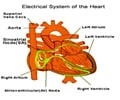Q: Which doctor should I consult for an abnormal heartbeat?
A: A cardiologist or Cardiac Electrophysiologist can help you in identifying the condition that is causing the abnormal heartbeat and help you manage the underlying medical condition.
Q: If I have a fast heartbeat, am I stressed out?
A: Heart rate goes up due to various reasons other than stress. The reasons include physical activity, fever or even during hot summer days.
Q: If my heart rate is normal, then I don’t have to worry about my blood pressure.
A: Usually, heart rate and blood pressure rise and come down together. But when blood pressure is higher, heart rate may not go up. It is important to check the blood pressure regularly.
Q: My heartbeat seems to be erratic, like missing a beat. Do I have a heart attack?
A: Erratic heartbeat, also called palpitations, may occur due to various reasons that may not be essentially related to the underlying medical condition. Diet pills, fever, hyperthyroidism, menopause, stress and exercise are some of the non-medical causes of heart rate increase. However, if the palpitations are occurring without any such reasons, and are occurring for the first time, it is better to check with your doctor.
Q: Does slow heartbeat mean a weak heart?
A: Slow heart rate does not always indicate a weak heart. A healthy heart or a heart that is well-conditioned with a lot of physical activity can have a slow and steady heartbeat. Slow heart rates can be considered as an indication of a medical problem only when it leads to feeling dizzy, shortness of breath, pain in chest and loss of consciousness.
Q: What is the myth about baby heart rate?
A: It is a common myth that fetal heart rate can be used to determine the baby’s sex during pregnancy. While normal fetal heart rate is between 120 to 160 beats per minute, people think that faster fetal heart rate indicates a girl and slower indicates a boy. However, no studies have conclusively proven that heart rate is a true predictor of the baby’s sex.








